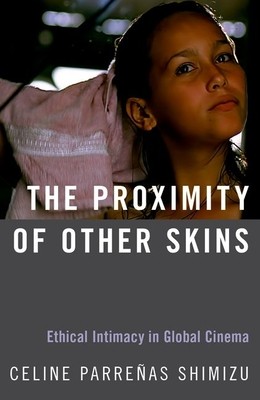
- We will send in 10–14 business days.
- Author: Celine Parreñas Shimizu
- Publisher: Oxford University Press, USA
- ISBN-10: 0190865865
- ISBN-13: 9780190865863
- Format: 15.5 x 23.4 x 1.8 cm, softcover
- Language: English
- SAVE -10% with code: EXTRA
Reviews
Description
Transnational films that represent intimacy and inequality produce new experiences that result in the displacement of the universal spectator, in a redefinition of the power of cinema for today's global audiences. The Proximity of Other Skins examines transnational films that achieve global prominence in presenting a different cinematic language of love and sex. Author Celine Parreñas Shimizu traverses independent films by Gina Kim and Ramona Diaz to the global cinema of Laurent Cantet, Park Chan-wook and Cannes award-winning director Brilliante Mendoza and their representations of transnational intimacies. In doing so, she addresses unexpected encounters in the global movement of people and goods within their geopolitical, historical, and cultural contexts. In these celebrated films that move across continents, she finds ways to expand our definition of intimacy, including explicit sex and relations that go beyond sex, enabling us the opportunity to theorize how people now live
together in many spheres of contemporary life. Readers can then better understand how intimacy can affirm and express love, but also alienate and oppress, revealing the loneliness, pain, and suffering within transnational, national, and personal relations of power and hierarchy. In studying representations of intimacy, the book calls to expand our vocabulary of moving images and its role in redefining care work and affective relations between people across difference and inequality. The book addresses cinematic intimacies between husbands/wives/lovers, understanding between sex workers and clients, close familiarity between rich and poor, and new affinities between citizen and refugee and laborer and capitalist.
EXTRA 10 % discount with code: EXTRA
The promotion ends in 14d.23:10:38
The discount code is valid when purchasing from 10 €. Discounts do not stack.
- Author: Celine Parreñas Shimizu
- Publisher: Oxford University Press, USA
- ISBN-10: 0190865865
- ISBN-13: 9780190865863
- Format: 15.5 x 23.4 x 1.8 cm, softcover
- Language: English English
Transnational films that represent intimacy and inequality produce new experiences that result in the displacement of the universal spectator, in a redefinition of the power of cinema for today's global audiences. The Proximity of Other Skins examines transnational films that achieve global prominence in presenting a different cinematic language of love and sex. Author Celine Parreñas Shimizu traverses independent films by Gina Kim and Ramona Diaz to the global cinema of Laurent Cantet, Park Chan-wook and Cannes award-winning director Brilliante Mendoza and their representations of transnational intimacies. In doing so, she addresses unexpected encounters in the global movement of people and goods within their geopolitical, historical, and cultural contexts. In these celebrated films that move across continents, she finds ways to expand our definition of intimacy, including explicit sex and relations that go beyond sex, enabling us the opportunity to theorize how people now live
together in many spheres of contemporary life. Readers can then better understand how intimacy can affirm and express love, but also alienate and oppress, revealing the loneliness, pain, and suffering within transnational, national, and personal relations of power and hierarchy. In studying representations of intimacy, the book calls to expand our vocabulary of moving images and its role in redefining care work and affective relations between people across difference and inequality. The book addresses cinematic intimacies between husbands/wives/lovers, understanding between sex workers and clients, close familiarity between rich and poor, and new affinities between citizen and refugee and laborer and capitalist.


Reviews